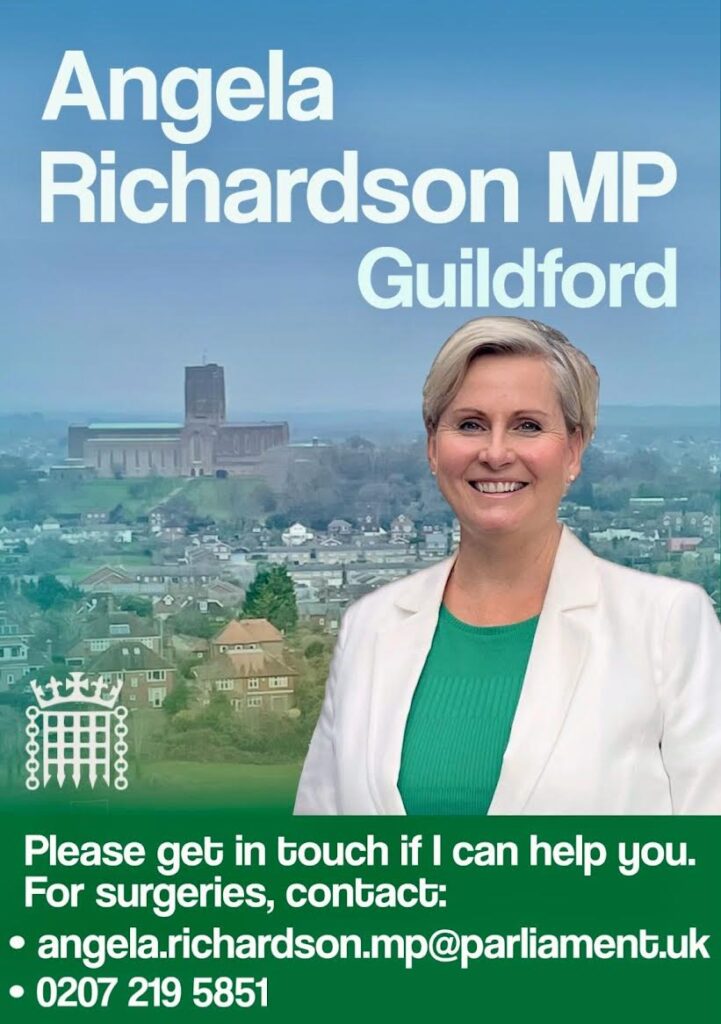 Abraham Lincoln
If given the truth, the people can be depended upon to meet any national crisis...
Abraham Lincoln
If given the truth, the people can be depended upon to meet any national crisis...
 Guildford news...
for Guildford people, brought to you by Guildford reporters - Guildford's own news service
Guildford news...
for Guildford people, brought to you by Guildford reporters - Guildford's own news service
Letter: 14 Million People in the UK Live in Poverty, 1.6 Million in Severe Poverty
Published on: 28 Oct, 2020
Updated on: 28 Oct, 2020
In response to: Some Points to Freely Digest
Jim Allen is another person who not only doesn’t understand the issue but completely misses the point.
There are plenty of hungry children in Guildford, maybe not as many as in other towns, but any number more than zero is too many. Some areas to the north of the town centre are in high-deprivation categories.
You only need to do a quick search, or visit a local food bank or support charity, to find ample evidence of this. But either way, how many hungry children in Guildford would be acceptable to him?
Most children who receive free school meals and many of those who rely on food banks are in working families. Sometimes this is both parents working, often multiple jobs.
Not only do we have a minimum wage significantly lower than the real living wage (and a coronavirus economic package which covers only a fraction of this inadequate amount), we have more insecure and zero-hour contracts than ever, huge unemployment, wages remaining stagnant since 2008 and prices that continue to increase.
Mr Allen seems to think “doing anything you can to find work” still entails walking up the High Street for 10 minutes, handing out CVs and having friendly chats with the local business owners.
Predictably, he doesn’t understand that if you’re looking for work nowadays, an internet access and a phone are essential. For most people, this is now the same thing.
There are 14 million people living in poverty in the UK at present, including 1.6 million in severe poverty, which means they cannot afford basics such as shelter, heating or food. We are rapidly approaching 30% of children living below the poverty line.
Does Jim Allen seriously think all of these people are idiots who prefer watching “fancy cable channels” than feeding their children? Perhaps when more than a quarter of the population is living below the poverty line in the world’s sixth-richest country, there is something structurally wrong with your society, rather than every one of those people?
Of course, all of this is beside the point. Not only does he seem to think all children who don’t have enough to eat in the UK have lazy, stupid parents, but also that these children, hungry through no fault of their own, deserve to stay hungry.
Even if we assumed that millions of parents in the UK didn’t care about their children and would happily let them starve, does that mean we should let them?
Maybe Mr Allen should read the UN rapporteur’s report on poverty and particularly child poverty in the UK from 2019 at https://www.newstatesman.com/
Editor’s note: Jim Allen does do charity work already, creating engineered solutions for the disabled.
Responses to Letter: 14 Million People in the UK Live in Poverty, 1.6 Million in Severe Poverty
Leave a Comment Cancel replyPlease see our comments policy. All comments are moderated and may take time to appear.

See Dragon story: GBC’s Explanation of Major Land Sale Notice Error ‘Borders on Arrogant’ Says Councillor







Recent Articles
- New Investment Will Help Surrey Fire and Rescue Service Improve Training Facilities
- Letter: Are the PCC Candidates Relying on Their Party Labels?
- Notice: Sing Barbershop – Every Tuesday
- Modernised Surrey Police Headquarters Will Require New Access Road
- Notice: Open Mic Night at the Guildford Institute – April 27
- ‘It Will Grow’ Says Councillor About Replacement Tree in Upper High Street
- Surrey Election Day Looms
- Letter: I Wish To Clarify the Situation Regarding the Lockwood Centre
- Councils Expected to Approve Appointment of Joint Permanent Chief Financial Officer
- Paramedic Students Have ‘Unique Vulnerability’ to Sexual Misconduct


Recent Comments
- Penny Panman on ‘It Will Grow’ Says Councillor About Replacement Tree in Upper High Street
- John Dawson on ‘It Will Grow’ Says Councillor About Replacement Tree in Upper High Street
- Frank Emery on Letter: A New Home for Guildford City Should Be on the ‘Brilliant Places’ Agenda
- Tony Palmer on Police Commissioner Candidates Confirmed
- David Sparkes on Looking Back To Treats Enjoyed By Staff Of Drummond Bros
- Anthony Mallard on Police Commissioner Candidates Confirmed
Search in Site
Media Gallery
Dragon Interview: Local Artist Leaves Her Mark At One of England’s Most Historic Buildings
January 21, 2023 / No Comment / Read MoreDragon Interview: Lib Dem Planning Chair: ‘Current Policy Doesn’t Work for Local People’
January 19, 2023 / No Comment / Read MoreA3 Tunnel in Guildford ‘Necessary’ for New Homes, Says Guildford’s MP
January 10, 2023 / No Comment / Read More‘Madness’ for London Road Scheme to Go Ahead Against ‘Huge Opposition’, Says SCC Leader
January 6, 2023 / No Comment / Read MoreCouncillor’s Son Starts Campaign for More Consultation on North Street Plan
December 30, 2022 / No Comment / Read MoreCounty Council Climbs Down Over London Road Works – Further ‘Engagement’ Period Announced
December 14, 2022 / No Comment / Read MoreDragon Interview: GBC Reaction to the Government’s Expected Decision to Relax Housing Targets
December 7, 2022 / No Comment / Read MoreHow Can Our Town Centre Businesses Recover? Watch the Shop Front Debate
May 18, 2020 / No Comment / Read More







M Smith
October 28, 2020 at 5:14 pm
‘Poverty’ in the UK just means a household income less than 60% of the average. It does not mean that these people are really ‘poor’ in the way that ‘poverty’ used to mean, just that they’re not as well off as most of the population.
Who really believes that there are 14 million people in this country living in real poverty?
Sam Peters
October 29, 2020 at 8:23 am
Just to correct a small error I made – we are actually approaching 40% of children living below the poverty line (an illustrious figure we were expected to reach by 2021, even before the impacts of coronavirus). As others have mentioned, there are around 15,000 children who receive free school meals in Surrey.
Ed: Article amended.
John Perkins
October 29, 2020 at 9:10 am
In his very personal criticism of the views of Jim Allen expects us to accept radical views of statistics nonetheless.
“Any number more than zero” is an attitude only available to the privileged. “High deprivation” is a relative term which can be adjusted to suit any argument. If deprivation is defined as not being able to afford a new gold watch every month then 67 million people in the UK are “deprived”. It’s certain that hundreds of millions of people in, say, Ethiopia, India and even China will look enviously on the deprivation endured here. That’s possibly why so many pay large sums to risk their lives coming here in rubber dinghies.
The same people might also look in wonder on the “necessity” of internet access, which entails having a roof over your head, a reasonable credit rating and the wherewithal to buy a computer and power it.
“Poverty” and “extreme poverty” are also relative terms which can be adjusted to suit a particular view and can then be used to make bald statements such as, “We are rapidly approaching 30% of children living below the poverty line”. Even the obviously exaggerated claim of “14 million” can then be exaggerated further to “more than a quarter of the population”.
Shelley Grainger
October 31, 2020 at 10:54 am
An extremely well put together letter by Mr Peters. It is worrying that two of those replying to this put very skewed views across, one comparing the poverty of developing nations to our own British poverty and another also objecting to the idea that anyone with the bare minimum of requirements needed to be an enfranchised, functioning member of society (internet access and a smart phone) are somehow not below the poverty line at all.
Yes there is abject poverty versus relative poverty, but our expectations of bare standards of living should be much higher than those countries where people suffer the deprivation of surviving in abject, stunting poverty.
The point is that in this wealthy (although extremely unequal) country, all children should have enough to eat. In the minds of right-thinking people, they should also have secure homes which are adequately heated, decent schooling, free healthcare and their parents should have internet access and a smart phone – so they can be part of society as well as find work.
George Potter
October 29, 2020 at 12:07 pm
This is an excellent letter. For further facts about food poverty I also highly recommend that people take the time to have a read of the Food Poverty report produced by Guildford Borough Council just last year and which goes into great detail about the nature and prevalence of food poverty within our borough:
http://www2.guildford.gov.uk/councilmeetings/documents/s13882/Item%2004%20-%20Appendix%201%20Task%20group%20report.pdf
It’s a very detailed and thorough report, and its publication was covered by The Dragon at the time, but it’s disappointing to see that, over a year later, so few people appear to have read it; apparently including our MP.
But, for the benefit of those without time to read the full report, I’d highly recommend reading at least the foreword which begins with:
“There has been a mass of evidence, with many facts and figures, which you’ll find as troubling as we did; however, our conclusion is clear – food poverty and insecurity exist in the Borough in both urban and rural settings.
“Food poverty and insecurity is not restricted to residents in our less advantaged areas. Our findings show that residents who live in our affluent areas experience food poverty and insecurity. This may be because they are ‘asset rich’ (ie, they own their own home) and ‘cash poor’ so they too struggle financially to pay for their basic needs.
“Our report concludes that the main cause of food poverty and insecurity is the changes to the benefits system for people of working age, against the backdrop of our government’s austerity measures. The rising cost of housing, especially in the rental market, and debt are also contributors as they stretch budgets to their limit.
“But what’s particularly interesting from the data, is that more and more working families are dealing with food poverty and insecurity (the in-work poor) and are having to make the stark decision whether to buy food or pay a bill (such as heating); we were told that parents are going without meals so that their children can eat.”
To my mind, I think this shows very convincingly that the issue here cannot possibly be parental “irresponsibility”, or an unwillingness to make sacrifices when so many of the parents in question are choosing to skip meals and go hungry in order to provide at least some food for their children.
George Potter is a Lib Dem borough councillor for Burpham.
David Pillinger
October 30, 2020 at 7:58 pm
We need to teach our people how to cook in a nourishing and cheap way using traditional methods like cooking basic ingredients rather than buying pre cooked food to re-heat.
In England, people generally have limited knowledge of cooking compared to other countries, and this is particularly the case the more you consider people in lower income category. I risk being accused of generalisations, I know, but have a look at shopping trolleys next time you go shopping.
John Perkins
November 1, 2020 at 9:27 am
I completely agree.
But I don’t know how people can be persuaded that their right to fast food is harmful to them.
Fast food is very tasty and, well, fast. There is a perception that traditional dishes take too long to make.
Traditional flavours have often been compromised over the years. When did you last eat a cucumber that didn’t taste like it had an earlier life in a British Rail sandwich? Those of us forced to eat boiled cabbage and stewed prunes as children also have an ingrained horror of some traditional English cooking.
I do agree, I’m just saying I don’t know what the answer is.